Classical Music for Babies – Benefits and Recommendations
We all love listening to different styles or genres of music. While some of us may be big fans of rock, jazz, pop, or contemporary, there are quite a few Western classical music fans too. However, are you aware that your baby can benefit greatly from classical music? Well, it may be hard to believe, but classical music may prove to be beneficial for your baby’s development, mood, and relaxation. The best classical music for babies has been shown to promote calmness and aid in improving sleep quality, which can be especially helpful for newborns and toddlers. Read this article to learn how this kind of music may impact your munchkin, and we shall also be sharing some of our Western classical music recommendations to help you get started.
Why Should You Choose Classical Music for Your Babies?
Is classical music good for babies? Well, many experts are of the opinion that there is a great significance of classical music for babies’ brain development. Here’s why you should opt for classical music for your babies:
1. It May Help with Your Baby’s Language Development
Listening to soothing music, such as classical music, may prove to be helpful for your baby’s language development. This is because babies or young children who listen to such kind of music on a regular basis develop better memory skills. Improved memory skills help in improving a baby’s language skills, both verbal and written.
2. It May Help in Impacting Your Baby’s Health in a Positive Way
Classical music and songs have soothing music and tunes. Such kind of music has a calming and soothing effect on your baby. A baby who feels calm and happy does better in terms of growth and development. Proper growth and development means improved overall health.
3. It May Help Your Baby Sleep Better
The relaxing and soothing effects of classical music help babies sleep better. It is observed that babies who sleep better, or are better rested, do better in terms of their overall development, in comparison to babies who have disturbed sleeping patterns or babies who do not sleep well.

4. It May Help in Improving Your Baby’s Mental Health
This is one of the most significant benefits of classical music for infants. Physical and mental health go hand-in-hand. Just the way a baby requires proper nutrition to maintain good physical health, it is equally important to nurture a baby’s mental health. Classical music does wonders in making your baby feel happy and calm. Listening to such kind of music helps in releasing feel-good hormones, also known as endorphins, in the body. Endorphins help in relaxing the brain and thus, improve the mental health of the baby.
5. It May Be Helpful in Creating Mozart Effect
Mozart effect is a term first used by French researcher Dr Alfred A. Tomatis. This researcher was of the opinion that listening to classical music can increase spatial-temporal reasoning abilities and also improve IQ. However, this theory has limited evidence. While some researchers support it, others negate its effect. Whatever may hold true, there is no denying that classical music has soothing and calming effects on babies.
6. It May Enhance Emotional Awareness
Classical music often contains a wide range of emotions, from joy to serenity. When babies listen to this music, they may start to recognize and respond to these emotional cues. This exposure can gradually foster emotional intelligence, helping them understand and process their own feelings more effectively as they grow.
7. It May Support Motor Skills Development
The rhythmic nature of classical music can encourage babies to move along with the tunes, stimulating motor skills development. Gentle swaying or rhythmic movements, even if small, are beneficial for coordination. Over time, such movements can support better motor skill refinement, which is essential in early childhood development.
8. It May Boost Concentration and Focus
Classical music, with its calming melodies, may help improve a baby’s ability to concentrate. Even though babies have short attention spans, listening to classical music can create a serene environment that encourages focus. Over time, this could help in developing better concentration skills as they grow and begin learning new activities.
What Kind of Classical Music Should You Choose?
Now, the next question that will pop into your mind is the kind of classical music you should choose. We suggest that you do not choose something too loud. Whenever you choose classical music for newborns, make sure you consider the following points:
- Opt for music that is simple to understand or comprehend. Any music that has a lot of instruments or vocals may confuse your baby. Opt for music that has fewer instruments and preferably no vocals. Simpler music pieces are not only enjoyed by younger children, but they may also understand the sounds better.
- Choose a steady and regular beat or rhythm. Anything that has steady beats may help your baby to work on his memory skills. Irregular beats may interest your baby or gain his attention but it may not be an ideal option for soothing or relaxing your munchkin.
- Choose music with beats instead of music with complicated vocals.
Keep these points in mind while selecting classical music for your little one to listen to, and let your baby soak in the true essence of some mesmerising classical beats.
14 Best Classical Music/Songs for Babies
Now that you know that classical music works wonders for your baby’s development, you may want to know what the best options for your baby are. Well, we have compiled a playlist of popular classic numbers that can help you decide:
1. Air from Orchestral Suite No.3 by Johann Sebastian Bach
Source – https://www.youtube.com/channel/UCUrm111d6khqrbz4dRj2xew
2. Trio for Violin, Horn and Piano by Johannes Brahms
Source – https://www.youtube.com/channel/UCXlURNokd9ZWd3a1XlD5Gng
3. Clarinet Quintet in B Minor by Johannes Brahms
Source – https://www.youtube.com/channel/UCMRyQBQOTB_hq2AUL8FY5xQ
4. String Quartets Op. 18 by Ludwig van Beethoven
Source – https://www.youtube.com/channel/UC2nmB4TXvPlIAm56EG-Ddow
5. Piano Trios by Wolfgang Amadeus Mozart
Source – https://www.youtube.com/channel/UCSRTzrEyid4XEtLGZ2KWY8A
6. Haydn String Quartets by Wolfgang Amadeus Mozart
Source – https://www.youtube.com/channel/UCfxeYn3puTh4kzo-FHq3MHw
7. Concerto for Flute and Harp by Wolfgang Amadeus Mozart
Source – https://www.youtube.com/user/Am4d3usM0z4rt
8. String Quartets Op. 33 by Joseph Haydn
Source – https://www.youtube.com/user/winkle522000
9. Suites for Solo Cello by Johann Sebastian Bach
Source – https://www.youtube.com/channel/UC9B6J4qn5M_TLMh7zX0ISBA
10. Goldberg Variations by Johann Sebastian Bach
Source – https://www.youtube.com/channel/UCA-IpTjz6JSc61fdwlSrLdA
11. Symphony No. 6 “Pastoral” by Ludwig van Beethoven
Source – https://www.youtube.com/watch?v=iMJPZ-mu-Ts
12. Pavane by Gabriel Fauré
Source – https://www.youtube.com/watch?v=SqEgbmNcNww
13. The Four Seasons: Spring by Antonio Vivaldi
Source – https://www.youtube.com/watch?v=e3nSvIiBNFo
14. Moonlight Sonata by Ludwig van Beethoven
Source – https://www.youtube.com/watch?v=4Tr0otuiQuU
These are some of our recommendations; however, there are many options or versions of classical music available for babies. You can also ask your friends or family members for recommendations as they may also know a few good numbers from experience.
Ways to Incorporate Classical Music Into Your Baby’s Day
Introducing classical music into your baby’s daily routine can be a simple yet effective way to enhance their development and create a soothing atmosphere. Here are some easy ways to incorporate classical music into your baby’s day:
- Play Classical Music During Bedtime: Soft classical music can be played during your baby’s bedtime to create a calming environment that encourages restful sleep.
- Use It for Nap Time Wind-Down: Classical tunes can help signal to your baby that it’s time to wind down, making it easier for them to settle for naps.
- Make It Part of Playtime: Adding classical music to playtime can stimulate your baby’s senses, making play more engaging and encouraging movement along with the rhythm.
- Include It in Morning Routine: Start the day with gentle classical music to create a peaceful morning routine, setting a calm tone for the day ahead.
- Use During Feeding Time: Classical music can make feeding time more enjoyable, helping both you and your baby feel relaxed and focused.
- Incorporate into Bath Time: Playing classical music during bath time can make it a relaxing, enjoyable experience, helping your baby feel safe and comfortable.
- Play It in the Background During Story Time: Having soft classical music in the background while reading to your baby can enhance focus and make story time even more enriching.
- Use It to Soothe During Fussy Moments: Classical music can help soothe your baby during moments of fussiness, creating a calming effect that distracts and comforts.
- Make It a Part of Your Evening Routine: End the day with relaxing classical music to help your baby transition smoothly to nighttime, creating a peaceful pre-sleep environment.
- Play It During Car Rides: Playing classical music in the car can make trips more enjoyable and less stressful, helping to soothe your baby during travel.
FAQs
1. Is there a specific type of classical music best for babies?
Gentle, soothing pieces, especially those with slower tempos and soft instrumentation, are generally best for babies. Composers like Mozart, Bach, and Debussy are popular choices for infant playlists, as their works often contain calming rhythms and melodies that are ideal for relaxation and focus.
2. How early can I start playing classical music for my baby?
You can start playing classical music for your baby even before birth, as some studies suggest that babies can recognize sounds and respond to music in the womb. After birth, playing classical music during calm moments, such as bedtime or feeding, can be beneficial and soothing for your newborn.
This was all about classical music and newborns. Music is soulful, and we will all agree to this. The kind of happiness, calmness or relaxation music lends us, we cannot achieve from anything else. Tune into some beautiful classical music and let your baby soak in its melody and goodness. However, make sure you do not play music at a high volume because that may not be good for your baby’s ears. Also, never use earplugs for babies as they, too, pose a threat to your baby’s ears. Play your baby some classical music and see how your baby starts enjoying it. You may even notice your baby moving his arms and legs in excitement. Wait until he starts walking, then he may start dancing too!
References/Resources:
1. How music affects your baby’s brain: Mini Parenting Master Class; UNICEF; https://www.unicef.org/parenting/child-development/how-music-affects-your-babys-brain-class
2. How to build your baby’s mental health: Mini Parenting Master Class; UNICEF; https://www.unicef.org/parenting/health/building-your-babys-mental-health
3. McElroy. M; Music improves baby brain responses to music and speech; University of Washington; https://www.washington.edu/news/2016/04/25/music-improves-baby-brain-responses-to-music-and-speech/
4. Jenkins. J; The Mozart effect (Journal of the Royal Society of Medicine); National Library of Medicine; https://pmc.ncbi.nlm.nih.gov/articles/PMC1281386/; April 2001
5. The Role of Music in Brain Development; University of Georgia Extension; https://extension.uga.edu/publications/detail.html?number=c1053-06
6. Chorna. O, Filippa. M, Almeida. J, Lordier. L, et al.; Neuroprocessing Mechanisms of Music during Fetal and Neonatal Development: A Role in Neuroplasticity and Neurodevelopment (Neural Plasticity); National Library of Medicine; https://pmc.ncbi.nlm.nih.gov/articles/PMC6446122/; March 2019
7. Poćwierz-Marciniak. I, Harciarek. M; The Effect of Musical Stimulation and Mother’s Voice on the Early Development of Musical Abilities: A Neuropsychological Perspective (International Journal of Environmental Research and Public Health); National Library of Medicine; https://pmc.ncbi.nlm.nih.gov/articles/PMC8393253/; August 2021
Also Read:
Comfort Your Baby Using Music!
Soothing Lullaby Songs for Babies to Sleep
Nursery Rhymes Songs for Babies with Lyrics
Was This Article Helpful?
Parenting is a huge responsibility, for you as a caregiver, but also for us as a parenting content platform. We understand that and take our responsibility of creating credible content seriously. FirstCry Parenting articles are written and published only after extensive research using factually sound references to deliver quality content that is accurate, validated by experts, and completely reliable. To understand how we go about creating content that is credible, read our editorial policy here.





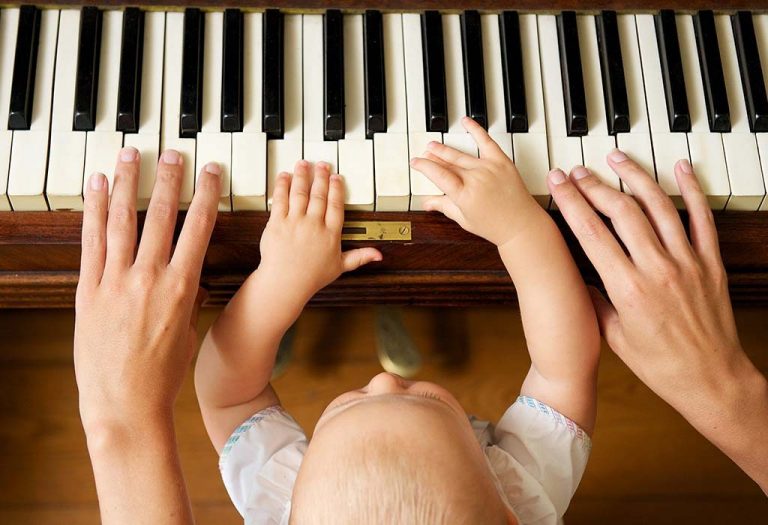
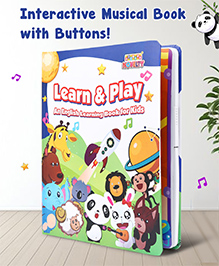
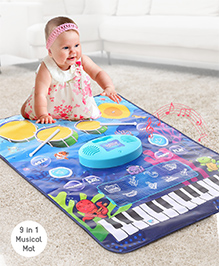
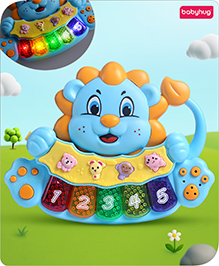
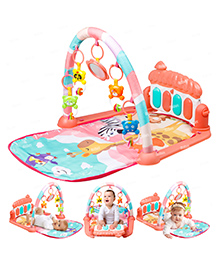
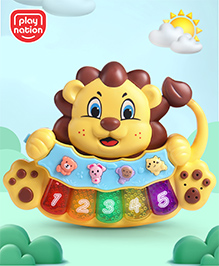
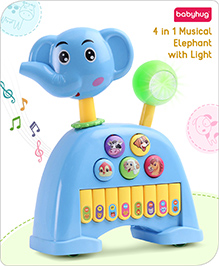
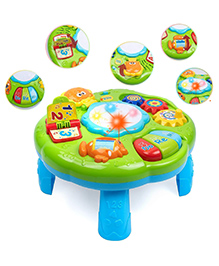





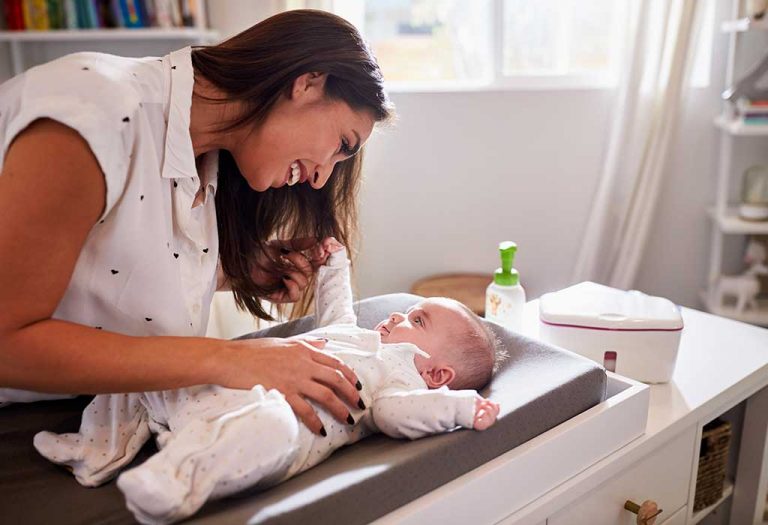

.svg)


















